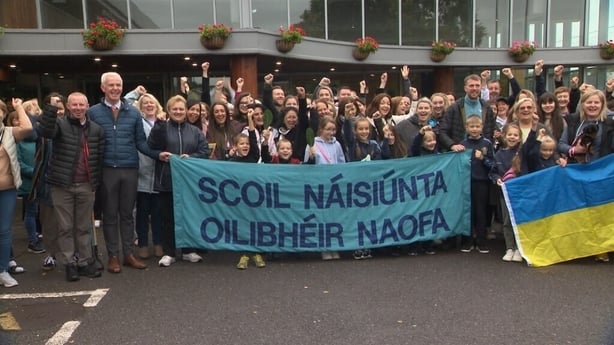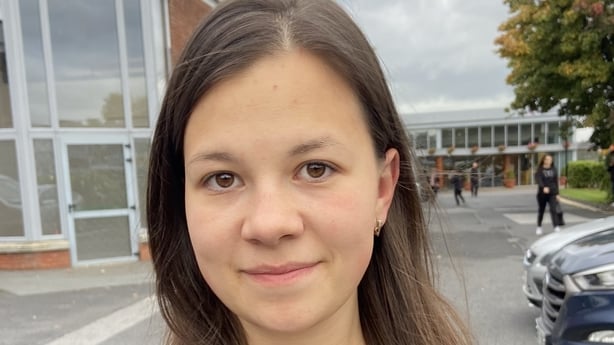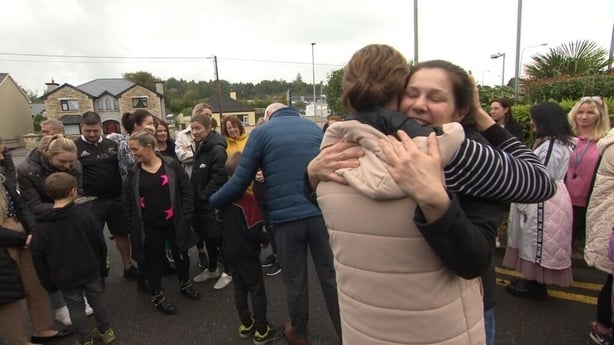The Department of Children, Equality, Disability, Integration and Youth has confirmed that the National Indoor Athletics Training Centre on Sport Ireland's Abbotstown campus will no longer be used to accommodate asylum seekers from Friday.
The facility, which could accommodate up to 200 people, was opened on 8 September amid a shortage of accommodation for international protection applicants.
At the start of September, the Department said that the transit at Citywest was closed to new arrivals, save for the most vulnerable, as it was at capacity.
As a result, over the course of a week, 201 newly arrived international protection applicants were not offered any accommodation when they presented to the International Protection Office and a number of them slept rough in Dublin city.
Today, the Department warned that "the transit centre at Citywest is nearing capacity and the possibility of a pause on entry to new arrivals to Citywest due to a nationwide shortage of accommodation cannot be discounted."
Earlier, Ukrainian refugees who were told they were being moved from the Hotel Killarney in Kerry, to Westport in Co Mayo, will now remain in the town following sustained local and political opposition to the move.

The 135 women and children moved from the hotel to alternative accommodation in the town.
Another 200 asylum seekers have already been moved into the hotel.
The Department of Children, Equality, Disability, Integration and Youth confirmed that another group, made up of women and children, will move into Hotel Killarney tomorrow.
They had been staying in a repurposed office building.
A department spokesperson said that there was a "need to move them to more suitable accommodation".
The decision to move the Ukrainian refugees elsewhere in the town was confirmed to Kerry TDs by Minister for Children Roderic O'Gorman's office this morning.
It has been welcomed by Deputy Government Chief Whip Brendan Griffin.
However, he said the decision should have been made earlier to avoid the trauma and worry caused to those involved.
And the reaction from #Killarney… @rtenews pic.twitter.com/O3y6ElOCy0
— Paschal Sheehy (@PaschalSheehy) October 12, 2022
The Mayor of Killarney and a number of local support groups had called on Minister O'Gorman to reverse the decision on the basis of the efforts that had been made to integrate the Ukrainian people into the community in Killarney.
Addressing the Select Committee on Children, Equality, Disability, Integration and Youth this afternoon, Mr O'Gorman said he "can't make a guarantee" that refugees will not be asked to move in future.
"We will try and avoid situations like this, because I am acutely aware that would have been traumatising for families," he said.
The minister said those families who will not now be moved will be provided with alternative accommodation in Killarney.
He said rooms in a hotel are being secured, but that this will not suit larger families for whom other accommodation is being sought.
The incident "is an indication of the real pressures and the difficulties associated with having to accommodate so many people in short periods of time," he said.

A Ukrainian refugee, who was due to be moved at short notice this morning from her accommodation in Killarney, has described the decision to cancel the move as "amazing".
Speaking on RTÉ's News at One, mother-of-three Olha Lukavska said: "We were ready to go into the bus, we had no news."
When confirmation came through that they would not be moving to Mayo, many of the children and staff were hugging, she said.
Ms Lukavska arrived in Ireland with two children and her third child was born and baptised in Killarney.
"I don't know what we will have, but I'm happy that we avoided changes. We have our lives here so it is very good that we can stay in this town," she added.
Earlier, Mayor of Killarney Niall Kelleher said there was accommodation available in Killarney where Ukrainian refugees could be housed and that a list of this accommodation had been given to authorities.
Speaking on RTÉ's Morning Ireland, the Fianna Fáil councillor said there were holiday homes and other houses in a complex available, as well as B&B accommodation.

The Ukraine Civil Society Forum thanked the people of Killarney and welcomed today's resolution.
A spokesperson for the UCSF said: "This situation is a symptom of an approach focused on bed management that does not bring into its decision making the impact on vulnerable women and children and a wider policy in relation to refugees that neglects long term planning.
"Such a proposed move is retraumatising and would cause untold damage to the children. We need to ensure that this does not happen again.
"Temporary Protection has now been extended to March 2024.
"We need to commence sustainable planning for accommodating people for the next two years and hotels are not suitable for families.
"We urge the government to immediately increase the manpower at a senior level to the Department of Children and to the local authorities so the capacity to manage the immediate crisis of beds is matched with a capacity to plan for the future that recognises refugees as people, traumatised and needing security."
'Over reliance' on temporary and emergency accommodation
Doras, the NGO which promotes and supports the rights of migrants, has welcomed today's decision in relation to Killarney.
However, it has expressed concern over "repeated examples" of one group of refugees displacing another from their accommodation.
In a statement, its CEO pointed out that in Laois last month, 15 Ukrainian families were given less than two days' notice to vacate the homes they made there over the previous six months.
John Lannon said there is an over-reliance on temporary and emergency accommodation for people arriving from Ukraine, as well as asylum seekers.
"It's chaotic and points to an urgent need for reform and leadership, including the establishment of a new Refugee Agency", he said.
Ireland should continue to welcome people who need protection, according to Doras, however it has said that commitments are needed to beneficiaries of temporary protection, and to international protection applicants.
Mr Lannon said they all need to be treated with dignity and respect.
"The suddenness of the proposed Killarney move was very concerning, with people given 48 hours to pack up and move to another location. Lessons were clearly not learnt from what happened in Laois."
He said such incidents can be devastating and re-traumatising for people who have established some normality in their lives after escaping from a war zone.
Mr Lannon also pointed out that it is particularly problematic for children because it disrupts their education structure.
While Doras has acknowledged that people might be happy to move, engagement with the those in the accommodation should be a first step.
The NGO acknowledged "the huge challenge" the Department of Children has in finding accommodation for over 50,000 people, including Ukrainians and increasing numbers of people from other parts of the world seeking international protection.
However, it has said the accommodation situation is not improving seven months into the war in Ukraine.
It said: "We've heard of congregated accommodation settings that are still like building sites, we've heard of staff that are inadequately trained, and there are concerns about child safeguarding in some centres.
"Right now, we also have over 300 asylum seekers that have to sleep in shared tents. Winter is approaching, they are cold, there's no privacy, and services are inadequate. It's not good enough."
It has called on the Government to ensure capacity at departmental and local authority levels to manage the immediate accommodation crisis and to develop and deliver on an effective, human rights compliant policy for refugee accommodation.
Additional reporting Paschal Sheehy, Micheál Lehane, Ailbhe Conneely







